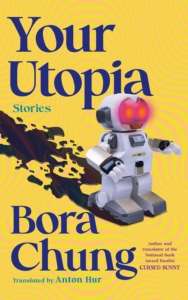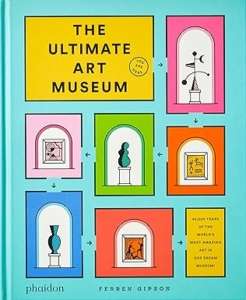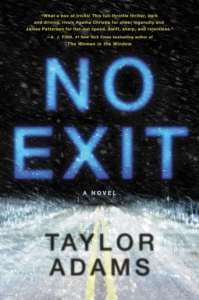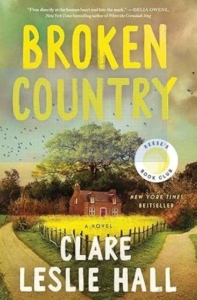
The Miracles of the Namiya General Store by Keigo Higashino
Higashino (Newcomer), a bestseller in his native Japan, departs from his normal thrillers to deliver a sparkling tale about opening up to others’ troubles. Shota, Atsuya, and Kohei are looking for a place to lay low after committing a robbery and end up in the abandoned Namiya General Store. While they are hunkered down, a letter slides through the store’s mail slot–an unnamed woman is asking advice about if she should dedicated herself to pursuing her Olympic dream or stay with the dying man she loves. Through reading the letters, they learn that Mr. Namiya, the former shopkeeper, had devoted his time to answering the mail of anyone in need of advice. Over the course of a single night, the three robbers read letters other people had sent and see their own views on humanity change. In one story, a man dreams of making it in the music world, but when he finds out that his father is sick, he must decide between pursuing his dreams and taking over his father’s shop (and sends a letter to Namiya for advice). In another letter and narrative thread, Takayuki Namiya is shocked to discover his father is healing from his own grief by giving advice to random people, but finally, in his father’s last days, he comes to understand the impact of the letters–both on his father and on those who solicited his advice. Those used to Higashiro’s more high-octane plots will discover a new side to the author in this satisfying outing. (Publisher’s Weekly Review, Sept.)
Available as book in New Adult Fiction.

Your Utopia by Bora Chung
Booker Prize–shortlisted Chung (Cursed Bunny) makes a dazzling return with these eight inventive tales. The collection opens with “The Center for Immortality Research,” which imagines bureaucracy, hierarchy, and capitalism continuing on for eternity. In “A Very Ordinary Marriage,” a man’s suspicions about his wife’s late night phone calls leads him down an uncanny rabbit hole. The standout title story examines a future in which artificial intelligence is all that remains on Earth. An autonomous vehicle travels aimlessly through this landscape, carrying a flawed humanoid robot that endlessly repeats variations of the same question–until a new variation of the question becomes a warning. Hur’s skillful translation feels authentic to Chung’s voice without an ounce of pandering to a potentially unaware Western audience. The author has an impressive ability to balance emotional and psychological depth with a touch of the surreal, creating a collection that resonates long after the final page is turned. A literary force to be reckoned with, Chung makes another splash. Publisher’s Weekly Review, Feb.
Available as a book in New Fiction.

The Ultimate Art Museum by Ferren Gipson
Gr 5 Up–Readers can rest their feet while they meander through an imagined art museum in this comprehensive review of human history and art through the ages. Produced in collaboration with art experts and educators, this volume presents exhibits from the Stone Age to the present. It is organized like a world famous museum. The table of contents is rendered as a color coded museum map–including three wings, several galleries, and over a hundred rooms that are grouped by time periods and themes. Each gallery includes a period overview and a colorful geographic map. The galleries are labeled with catchy titles such as “Holy Moly” and “Acting Out.” The panels include photographic views and descriptions of the most significant artifacts and structures of the era. Smaller panels provide magnified views and fascinating facts about the featured works. Critical thinking questions and activities will encourage students to make multifaceted connections. A museum guide, glossary, index, and picture credits are included in the back matter. The lack of formatting of the picture credits may cause confusion if source or location information is needed. This reference work does not have the visual appeal of Aaron Rosen’s A Journey Through Art: A Global History, which provides contextualized learning through its expressive illustrations; however, it covers more cultures and works of art from six continents of the world. Include both titles in your library to give readers a thorough overview of the history of civilization and art. VERDICT A recommended world art survey that can be utilized for art history instruction, school reports, and inquisitive browsing.–Rita Christensen, School Library Journal Review
Available as book on children’s nonfiction.

No Exit by Taylor Adams
College student Darby Thorne, the heroine of this nail-biting thriller from Adams (Our Last Night), braves a Colorado blizzard to try to reach her mother, who’s in the late stages of pancreatic cancer. But the weather is too much for Darby’s aged Honda Civic, and she’s forced to spend the night at a rest stop visitor’s center. The volunteer-run facility is nearly empty, except for four other stranded travelers-a quirky, but seemingly harmless group of strangers. That is, until Darby goes to the parking lot, in search of a cell signal, and finds nine-year old Jamie “Jay” Nissen-mouth duct taped, in a dog crate, locked inside a van. With no cell service and no prospect of the roads being cleared until dawn at the earliest, Darby has to figure out a way to save Jay. The only problem, she doesn’t know which traveler is the kidnapper or who can be trusted. The action drives to a climatic and emotionally charged ending. Only a predictable twist and moments when Jay’s maturity feels beyond her years mar this otherwise satisfying page-turner. (Publisher’s Weekly Review, Jan.)
Available as an ebook.
 Mary Berry’s Complete Cookbook by Mary Berry
Mary Berry’s Complete Cookbook by Mary Berry
More than 650 classic recipes from Britain’s best-loved cookery writer.
Britain’s best-loved cookery writer, Mary Berry, is back with an updated edition of her bestselling complete cookbook. Learn to cook like your favorite TV chef with hundreds of delicious tried-and-tested recipes and must-know cooking techniques for you to give a whirl.
From mouth-watering classics like cheesy cottage pie, steak Diane, and salmon en croûte to family favorites such as lasagne, chili con carne, and three-cheese macaroni, you’ll find your belly full and your heart fuller. With some exciting twists and turns along the way – prawn tacos, Thai spiced soup, and stir-fried Chinese noodles – there is something for everyone! Not to mention a sumptuous collection of desserts guaranteed to satisfy your sweet tooth, including cakes, pastries, soufflés, and trifles.
In this book, you will find over 650 photographed recipes – from classic family favorites to dinners with a twist, and there is something for everyone in this much-loved cookery bible. It is packed with tasty dishes, with meat and vegetarian starters, mains, and desserts. Perfect for everyday cooks, baking enthusiasts, and Mary Berry fans alike, Mary Berry The Complete Cookbook is the crowning glory of every cook’s shelf.
Available as a book in New Nonfiction.

Broken Country by Claire Leslie Hall
English writer Hall serves up twist after twist in her canny U.S. debut, a story of grief, love, and murder set in the Dorset countryside. The year is 1968 and Beth Johnson, wife of gentle sheep farmer Frank, remains shattered by the death of her nine-year-old son, Bobby, in an accident two years earlier. Her first love, Gabriel, a bestselling novelist who grew up wealthy on a nearby estate, returns with his young son, Leo, after separating from his American wife. Beth reconnects with Gabriel, fantasizing about rewinding her life to a simpler time, and she forges a bond with Leo, who reminds her of Bobby. An unreliable narrator, Beth provides a blinkered view of the action, mentioning early on that a farmer has been murdered and someone close to her is on trial for the crime, but neglecting to reveal the identities of these two characters until more than halfway through the narrative. As a result, readers are kept guessing about the precise consequences of Gabriel’s return and the circumstances behind Bobby’s death. Hall makes Beth a fascinatingly complex lead who vacillates between restlessness and contentment, and the other characters’ motivations prove to be different than they seem at first glance. This sharp morality tale will stay with readers.(Mar.)
